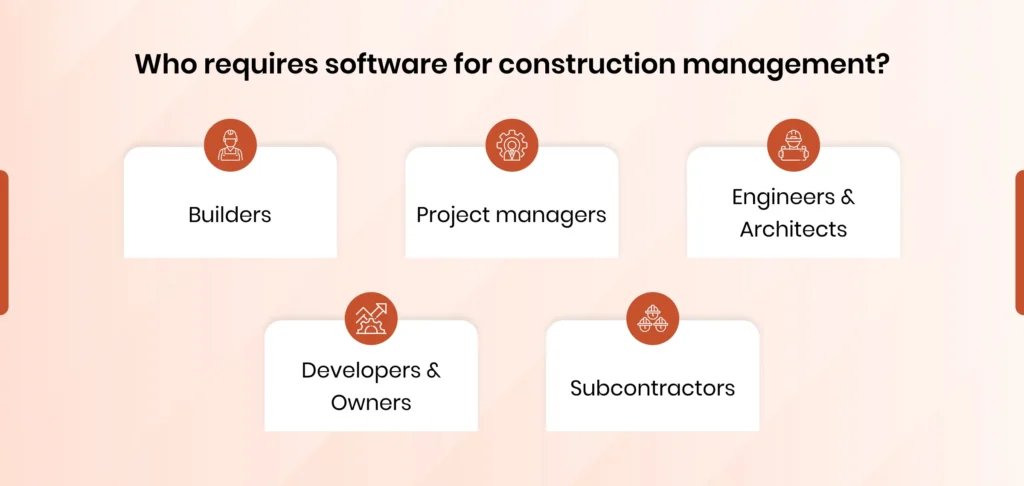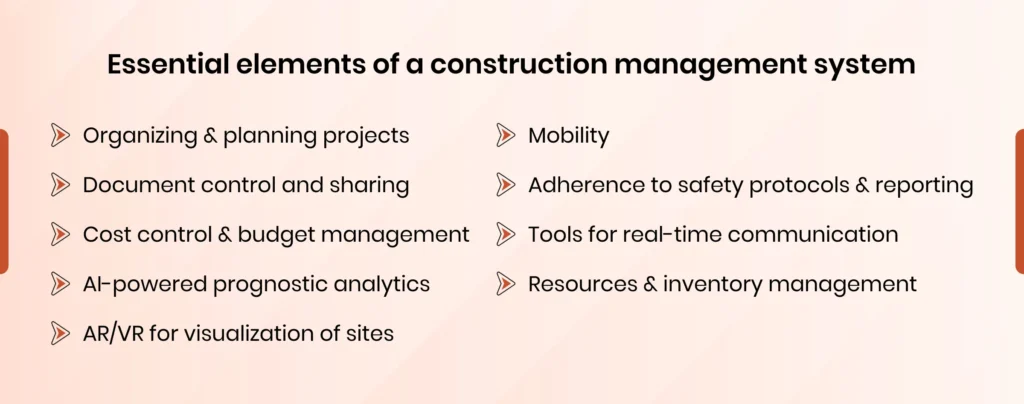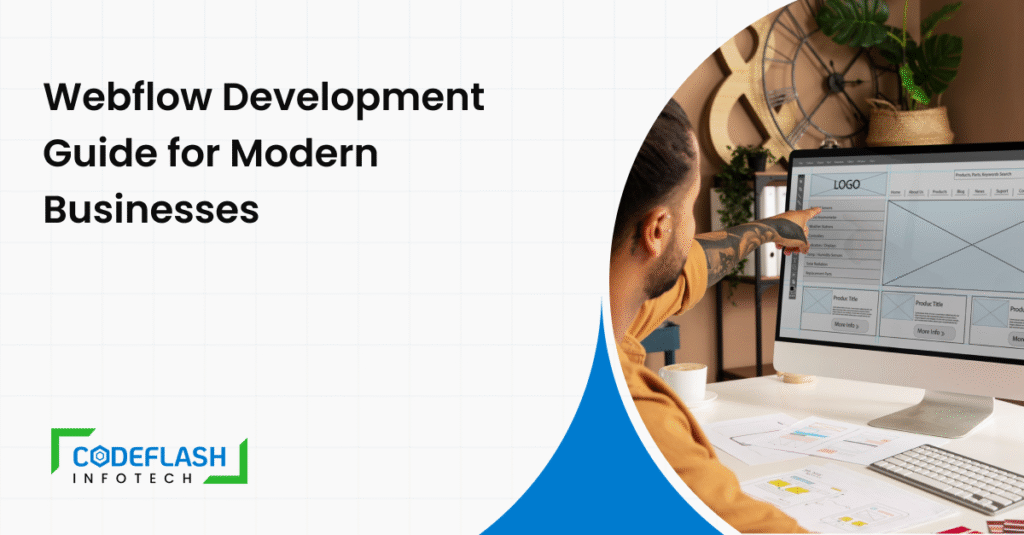
Construction Software Development: Features, Costs, and Benefits
06 SEPTEMBER
One of society’s propelling forces is construction. Therefore, it must be improved to Satisfy the growing demand. Technology is used in every aspect of life today, and Construction Software Development is no exception. Construction management software has made construction Operations better, more efficient, and less
time-consuming.
The construction management industry is predicted to expand at a 10.67% CAGR by 2025. Over 70% of the most successful projects have included construction management software.
This demonstrates how construction management may significantly enhance project Operations. Currently, creating construction management software involves many steps. However, firms need to be more conversant with it.
You will find all the information about construction software management, including its definition, Needs, advantages, costs, and considerations. Now that we have stated this, let’s get Started;
Software for construction management: what is it?
Software related to construction operation management is referred To as construction management software. Put another way, this software facilitates the organization of many construction-related tasks, increasing productivity and efficiency.

Who Requires Software for Construction Management?
- Builders
Construction software development can benefit contractors by facilitating the Administration of resources, time, and projects. It helps with job organization, activity documentation, and task completion control in a timely and effective manner.
Not only Do regular reports and real-time updates facilitate improved decision-
making, but this Software also improves the general efficiency of project administration. - Projects Managers
Construction managers use construction management applications to evaluate project progress, work division, and schedule compliance.
Project managers can monitor everything and address issues as they arise or avoid them altogether with the Help of tools like schedules, resources, and performance reports. - Engineers and Architects
Architects and engineers depend on construction management software to facilitate Collaborative design and efficient project administration. The program allows them to track changes, Ensure that everyone uses the exact version of the design, and share and compare the designs.
Its communication and document management capabilities Improve project outcomes and help prevent misunderstandings. - Developers and Owners
Building software development facilitates tracking a project’s status, finances, and Advancement for developers or owners. In this manner, the program provides reports and real-time status to support informed decision-making, monitor potential hazards, and ensure that the project is completed on schedule.
Additionally, it facilitates Communication with project managers and contractors. - Subcontractors
Subcontractors use construction management software to plan and manage their Resources and tasks within a larger project. The software helps them monitor their work, submit reports to the principal contractor, and complete the project by the deadline.
Additionally, it can communicate and manage resources, which Improves coordination and production.

Essential Elements of a Construction Management System
When developing construction management software, it is imperative to ascertain its Fundamental features. These characteristics make sure the program efficiently satisfies industrial requirements.
Organizing and Planning Projects
Any construction management software must feature effective project management and scheduling. These features ensure that projects proceed as planned by Streamlining workflows. They improve efficiency by making it possible to plan labor, Schedules, and resources precisely. Teams can increase efficiency and Prevent bottlenecks using job allocation tools and tracking deadlines.Through integration with calendars and email alerts, everyone is kept aware of schedule modifications and important milestones. Advanced scheduling features can also anticipate delays and provide alternatives to maintain project progress.
Moreover, customized reports assist in spotting patterns, projecting results, and Highlighting problem areas. Although adding these elements can raise the price of building construction management software, they are invaluable for maximizing project outcomes and management and provide a substantial return on investment.
Document Control and Sharing
Managing and exchanging documents are essential for optimizing the information flow in building projects. Thanks to these features, project papers may be efficiently shared, easily retrieved, and stored safely.Centralized document management reduces Data loss risk and improves team members’ collaboration. Version control minimizes errors by ensuring everyone operates from the most recent plans.
Access permissions ensure that private information is kept safe and available to Authorized staff. Quickly transmitting Drawings, specs, and reports further facilitates timely decision-making.
Cost Control and Budget Management
Efficient cost and budget control are crucial for the financial stability of construction projects. Asset management software enhances these capabilities by enabling real-time budget allocation and expenditure tracking, offering a comprehensive overview of the financial landscape.
With detailed cost reporting, project managers can identify potential overruns early and make timely adjustments. The software also integrates invoicing and procurement processes, streamlining payment processing and improving cost management. Financial dashboards and customizable budget templates provide insights into economic performance, aiding in better decision-making. These tools are vital for maintaining profitability, ensuring projects stay within budget, and avoiding unexpected financial setbacks.
This makes Asset Management Software Development Guide an essential resource for construction professionals seeking to optimize their financial management processes.AI-Powered Prognostic Analytics
Predictive analytics powered by AI has the potential to significantly improve building project outcomes. Using data analysis, this sophisticated tool forecasts project risks and possibilities to help with strategic decision-making.Artificial intelligence (AI) systems provide proactive project management by forecasting possible delays, cost overruns, and resource shortages. Additionally, these insights raise productivity and efficiency by optimizing scheduling and resource allocation.
Over time, predictions become more accurate due to the constant improvement of machine learning algorithms. With such advanced features, construction management software may be more expensive to develop. Still, there may be a significant return on investment in the form of enhanced project performance and reduced risk. This technology is changing the planning and execution of building projects.
AR/VR for Visualization of Sites
Construction management software that utilizes AR/VR technology can offer immersive site visualization features. Before work starts, stakeholders can examine construction projects virtually. This innovation improves decision-making, increases planning accuracy, and detects problems early.AR/VR provides a secure and efficient way to acquaint teams with intricate processes during training. Additionally, it enhances customer presentations by offering a realistic perspective of the suggested results. Integrating AR/VR requires specific knowledge and equipment, which may result in higher development costs for construction management software.
However, the gains in accuracy, effectiveness, and customer involvement make the expenditure worthwhile. This functionality is a big step toward making construction management procedures future-proof.
Mobility
Construction management software must be mobile-friendly to provide flexibility and quick access to project data. It promotes smooth cooperation by enabling users to share essential papers, indicate problems, and quickly update progress.This skill greatly improves problem response and project management. Push alerts ensure interested parties are aware of important updates or modifications.
Adherence to Safety Protocols and Reporting
For building projects, ensuring safety compliance and efficient reporting is essential. This feature lowers risks and liabilities by managing and recording all safety procedures. It makes it possible to log safety meetings and incidents, simplifying compliance verification digitally.Automated warnings for unmet requirements or data breaches improve proactive management. By incorporating robust analytics, safety incidence trends may be found, which helps direct preventative actions.
This focus on safety benefits the project’s overall efficiency and workers’ safeguarding. Although adding these features could raise the price of developing a construction management program, the expenditure is worthwhile. Its importance is shown by the significant mitigation of potential hazards and legal issues that it offers.
Tools for Real-Time Communication
Effective construction project coordination requires real-time communication technologies. They enable real-time updates, video conferencing, and instant messaging, which helps teams stay in sync. Regardless of location, these tools guarantee accessible communication among all project stakeholders.Projects can move forward without delay by offering a forum for quick feedback and decision-making. These technologies work together to create a collaborative atmosphere for quickly resolving issues.
Due to the requirement for dependable, scalable infrastructure, including such features will impact the cost of developing construction management software. On the other hand, the investment improves project management skills, which is crucial for contemporary construction management solutions.
Resources and Inventory Management
Efficient management of resources and inventory is essential for maximizing project completion and reducing waste. This feature makes it possible to track workers, supplies, and machinery throughout projects precisely. It makes ensuring that resources are distributed effectively, avoiding surpluses and shortages.Monitoring real-time inventory levels allows project managers to make well-informed judgments and place timely supply orders. Comparing actual and projected resource utilization is another way this functionality helps with budget management. Advanced analytics facilitates the discovery of patterns and areas where money might be saved.
Factors affecting the cost of Construction Software Development
- Features
The fundamental principle in software development is that costs rise with the number of features and functionalities included. Essential tasks like project planning, scheduling, and document management are less expensive than advanced capabilities like real-time analysis, mobile access, and integration with other applications. When considering these factors, the POS Software Development Guide: Costs, Features provides valuable insights into balancing basic needs with additional functionalities, helping businesses determine the most cost-effective solutions for their point-of-sale systems. - Technology Stack
The choice of technology stack can impact the cost of developing software for construction. While premium technologies and platforms may be expensive, open-source frameworks and technologies are typically cheaper. - Development Group
Another significant element that determines the price is the number and caliber of the team offering software development services. While hiring experts and developers with more expertise may cost extra, it will enable quicker and higher-quality development. - Project Schedule
The development timeline and cost are related. In contrast, a longer timeline indicates the costs are dispersed, but the project has yet to start as quickly. A quicker timeliness implies using more resources and a higher project cost.A highly complicated program can cost anywhere from $100,000 to $300,000. Essential software with a minimal feature list can cost anywhere from $30,000 to $100,000.
Conclusion
Developing construction software is a company’s strategic decision, not just adding another application. Construction management software is ideal for streamlining construction coordination, fostering stakeholder collaboration, and driving project success. As the field of construction project management evolves, future advancements in artificial intelligence, machine learning, and advanced analytics will only increase the importance of these technologies.
With Codeflash Infotech software solutions in construction management, Indian businesses can potentially grow and improve. We offer easy-to-use features to handle multiple projects. Contact us today and start your journey towards a brighter construction future!
Frequently Asked Questions
In the US, developers charge between $140 and $150 per hour to create unique software. Because hiring developers in the US might lead to much higher development expenses, it is best to outsource the software development project to a nation such as India, where hourly rates for professionals are as low as $40–60.
The time required to develop custom software depends on the project’s complexity and requirements. For example, software with an extensive feature list will take longer to develop than software with a smaller feature list.
While simple software can be produced in 4–5 months, complicated software can take up to 12 months to construct. Rushing the bespoke software development process can result in a final solution that isn’t sustainable and subpar.
Microsoft Project, Primavera Project Planner, JIRA, Concerto, and other software development organizations’ top cost estimation tools are included here. Estimated Cost Distribution:
- $50,000 to $100,000 for software that is necessary for construction management.
- Mid-Range Software for Construction Management: Between $100,000 and $250,000.
- Above $250,000, Advanced Construction Management Software





